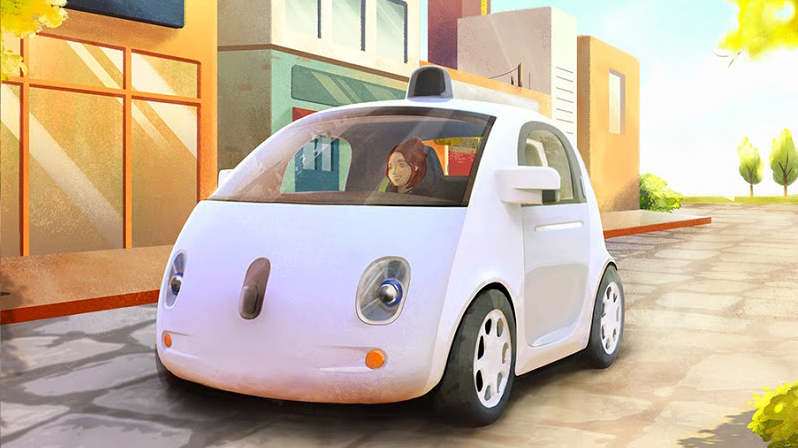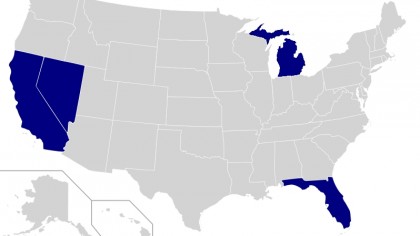
The dream of driverless, self-driving cars has existed since the space-age 1960s. Save for a few experiments dating as far back as 1925, the idea of a car that can drive itself has largely been the stuff of sci-fi books and films.
While technology has been cooked up in everything from the Commonwealth sci-fi saga classic to Disney's World of Tomorrow, the utopian vision of driverless technology has always imagined as a from of transportation that's faster, more efficient and, most importantly, safer.
Last month, the world took another big step towards making driverless cars an on-the-roads reality.
California Governor Jerry Brown signed senate bill SB1298 into state law on May 22, allowing the first licensed autonomous vehicles to roam freely on the California's roads. Not just test courses or closed-off paths, but the highways and public streets everyone drives everyday.
Although driverless cars have been roaming around for years such as Google's robot wheels in Mountain View, the new law will bring even more autonomous vehicles into the fold.
The new legislation allows the California Department of Motor Vehicles to grant licenses for driverless cars starting in September 2014. The rules are for a $150-a-pop license that covers up to 10 vehicles and 20 test drivers. Add up the numbers and that's a lot of additional robot rides on the road. But as California DMV Deputy Director Bernard Soriano tells TechRadar, it was necessary to regulate the future of autonomous vehicles and protect the safety of everyone else.
A need for regulations
Google isn't the only one that's been testing been autonomous vehicles. Soriano shared that every major car manufacturer - from BMW to Nissan and Honda to Chrysler - have been working on their own technology and driving autonomous vehicles in a much less advertised fashion than Google.
Get daily insight, inspiration and deals in your inbox
Sign up for breaking news, reviews, opinion, top tech deals, and more.
"There are no federal motor vehicle safety standards for autonomous technology," Soriano said explaining the problem of regulating these auto autos. "How do we ensure that these vehicles are safe when there are no standards to point to? That's the problem we're wrestling with."

Typically the state-level government is tasked with overseeing its drivers via the DMV while the onus of ensuring the safety of automobiles falls to a federal agency called the National Highway and Traffic Safety Administration (NHTSA). Soriano said the NHTSA has readily admitted it's years away from writing any regulations around autonomous vehicles. For now, it's up to the California DMV to write the rules.
Brad Stertz, corporate communications manager at Audi America, explained that prior to the Californian law, the responsibility of insuring the safety of driverless vehicles fell squarely on carmakers.
"Many states don't have many laws governing [autonomous cars], so it's allowed or if they do have a law we will follow it," Stertz said. "Usually it's an engineer able to control the car and one other engineer in the car watches the technology."

Audi has already done a good bit of autonomous vehicle research between its research lab in Belmount, Calif. and Nevada. It's also been researching the technology since 2004 as part of the DARPA Grand Challenge, a race of sorts to foster self-driving car development.
With the new state regulations, Stertz doesn't imagine there will be a big impact other than adding a new layer of accountability for autonomous vehicles. On the grander scale, however, it could lead to the creation of federal laws that recognizes self-driving technology and allows it to operate throughout the entire United States.
"Currently there are no interstate laws for autonomous technology," Stertz said. While a vehicle might be able to operate in California, it could cross the state line into Arizona, where self-driving cars aren't yet recognized.
Kevin Lee was a former computing reporter at TechRadar. Kevin is now the SEO Updates Editor at IGN based in New York. He handles all of the best of tech buying guides while also dipping his hand in the entertainment and games evergreen content. Kevin has over eight years of experience in the tech and games publications with previous bylines at Polygon, PC World, and more. Outside of work, Kevin is major movie buff of cult and bad films. He also regularly plays flight & space sim and racing games. IRL he's a fan of archery, axe throwing, and board games.
